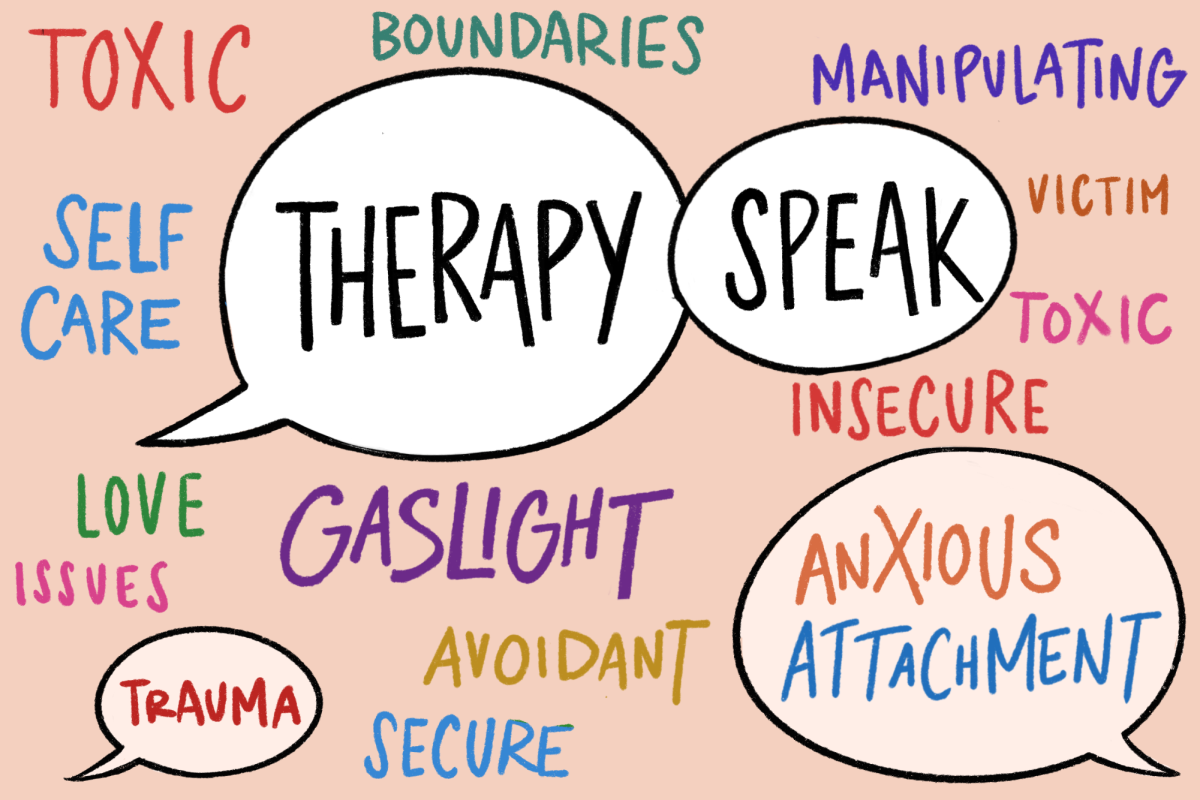In 2025, mental health has become an industry of its own, flooding social media feeds and everyday conversations, and while this new normalization has had positive effects, it has also led to what social scientists call “therapy speak.” Therapy speak refers to the overuse of terms like toxic, attachment styles and gaslighting, which have been weaponized to justify self-centeredness and avoid personal accountability and growth. Though it’s important for mental health and therapy to be normalized and talked about, the incorrect use of clinical terms and phrases can become damaging, creating distance between people in conversation.
Phrases once usually heard only in psychiatrist offices have become popular in everyday conversations. The incorrect, overuse of this language can be damaging, as it confuses clinical diagnoses with everyday hardships, and minor discomforts turn into perceived trauma. The word gaslighting is thrown around to describe a simple disagreement. Each inconvenience is deemed traumatic. This diminishes the seriousness of psychological harm and leads us to pathologize and diagnose one another rather than try to understand one another. When these terms are stripped of their clinical meanings, they serve as an opportunity to prioritize our own comfort above empathy and obligation to others — phrases meant to empower people in unhealthy relationships are used to justify neglecting patience and compromise in relationships in the name of protecting your peace.
The phrase “you don’t owe anyone anything” has become a common outcry from Gen Z. In the proper context, this phrase can be valuable advice to protect someone from emotional exploitation, but it has become synonymous with detachment and individualism. People abusing this phrase have come to use it to avoid the discomfort or inconvenience of basic human decency in relationships or community. Instead of looking for ways to create and maintain community, Gen Z has taken the apathetic route, avoiding inconvenience at all costs, even if it means letting others down.
Self-care has become an excuse for neglecting those around us and not showing up for others. The reality is that human beings do owe each other empathy, respect and decency as we move through life: consideration and understanding for strangers, time and effort for our communities, love and communication for our friends. We owe it to others to apologize when we’ve made mistakes and communicate when they have. We owe it to show up and care about other people. Apathy and hyper-individualism have dire consequences for society as a whole. When we stop caring about others, we begin to see other human beings as expendable — only there to provide us with something.
Breaking this cycle of apathy is important, and that starts by using these therapy terms responsibly and never as an excuse to let down those who need us. We also need to recognize the importance of reciprocity and connection. Everything has been built on the contributions of others, from your local grocery store to the sidewalks you walk on — other human beings contribute their own time and skills for you to be able to go to school or eat a Crunchwrap Supreme at 1 o’clock in the morning. People must rely on one another in order for a society to function and grow.
So yes, we do owe people something, especially those close to us. And when we try to foster a sense of community around us, we must not only focus on our actions, but our language too. We cannot allow our concern for mental health to turn into a justification for self-centered behavior. Luckily, the fix is simple: Start showing up and speaking with care. Volunteer to dogsit for your friend for a weekend, lend your neighbor gardening supplies or pick up trash in your local park. Show up for your community and use your words to support your peers. Create community wherever and whenever you can before capitalist individualism commodifies the last of human connection.
WSN’s Opinion section strives to publish ideas worth discussing. The views presented in the Opinion section are solely the views of the writer.
Contact Sam Kats at [email protected].























































































































































